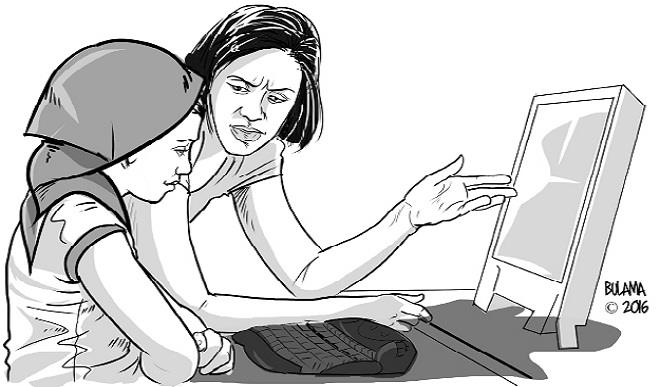Should parents monitor their kids’ online activities?
The social media is an amazing resource for information and entertainment. It is also a means where people can reconnect with friends and family members who they lost contact with for years. The use of social media is not restricted as it cuts across people of all ages, especially among kids and teens who […]


The social media is an amazing resource for information and entertainment. It is also a means where people can reconnect with friends and family members who they lost contact with for years.
The use of social media is not restricted as it cuts across people of all ages, especially among kids and teens who now seem to have more social media presence than adults. With cyber-molestation, cyber-crime and stalking on the rise, there have been debates about parents monitoring their children’s activities online. Life Xtra takes a look at the controversial topic and presents the varying opinions of respondents.
Na’ima Musa, an undergraduate in her early twenties, thinks parents should monitor their children’s online activities. ‘’They need to know what they are doing on social networks. They have the right to know. Parents want only the best for their children and they can help them at any time. It is never a good thing for a child to spend too much time online. There are hackers and cyber bullies, stalkers, killers, rapists and child molesters in this cruel world,” she said.
Vou Jugu, who is in her late 20s, asked rhetorically: ‘’How can you permit a child who is about 10 years old on social media? What is he or she there to do? Have you as an adult been able to handle the stuff you see on Facebook talk, less of a kid?”
She added that: “I feel allowing kids of certain age as such on social networks takes away their innocence and projects them as preys or targets to dangerous people who are also on such media looking for vulnerable ones.”
Tosin Olowolafe Iwunor, a mother of one, also thinks parents should monitor their children’s online activities. “We live in a perilous time and our kids are exposed to so much evil everywhere, what they watch on the television, hear on the radio and even see on the Internet. And now our kids are using Mobile so I think it’s necessary,” she stressed.
Melodie Dharmie Hunjo, a make-up artist in her mid-20s, who is not a parent, thinks there is no need for parents to monitor their kids online. “I don’t see any need to snoop. You are paying for the Internet connection. You have a right therefore, to know what sites they are visiting. Place the computer in an open place, so that they are conscious of what sites they visit. Let them be aware that you will check the browsing history,” she advises.
Hunjo added that there are chances of kids using cell phones and visiting cyber cafes to get to sites that they shouldn’t. “In my opinion, it should be approached holistically. I mean, if you have taught your kids not to watch certain movies from the word go, they won’t grow up and start looking for such movies online,” she stated.
Citing a personal experience, she said: “While growing up, wrestling and boxing were an absolute no in my house. Now, you will never catch me or my brother watching it. Never! So we definitely didn’t go to the Internet in search of such. It’s a matter of what the parent has enforced and reinforced. That way when you do check what they have been doing on the Internet, you can rest somewhat easy.”
Other respondents like 29-year-old hairstylist and a mother of two, Happiness John however, had contrary views. “The kids would feel as if the parent wouldn’t trust them or if they ever trusted them,” she said. “The worst feeling from a child is when they know that their parent doesn’t trust them or feel like their parent is looking for personal information.”
Josh Uche, a graduate in his early twenties, agrees with John. “If my parents consistently check my activities or what I do online such as reading my mails, my chats on messenger or Whatsapp, it means they don’t trust me and they don’t believe in my ability to do the right thing,” he said.
“Parents should give their children some benefit of the doubt and see what they can do with the trust they have already built in them. If the children fail to put this trust to good use, then they can now take decisive action, especially with regards to their online activities,” Uche added.
